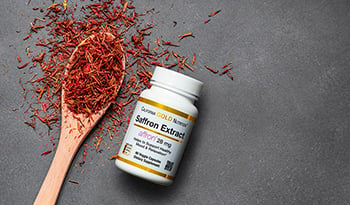N-Acetylcysteine (NAC): Research on Benefits for Mental Health

N-acetylcysteine (NAC), a form of the amino acid cysteine, is widely used in emergency medicine to treat individuals who overdose on acetaminophen or paracetamol. Placebo-controlled studies have investigated the effectiveness of NAC as a treatment of major depressive disorder, bipolar disorder, schizophrenia, trichotillomania and other impulse control disorders, and substance use disorders. NAC is generally well tolerated at dosages used to treat psychiatric disorders however some patients report nausea, vomiting, heartburn, rash and fever. Studies investigating the benefits of NAC for major psychiatric disorders report mixed findings. This article will provide a summary of the research highlights.
N-acetylcysteine (NAC): Mechanism of Action
NAC restores levels of the body’s principal antioxidant glutathione, a molecule that plays an essential role in scavenging toxic reactive oxygen molecules (i.e. ‘free radicals’) hence reducing intracellular damage caused by these highly reactive molecules. NAC also reduces serum levels of pro-inflammatory cytokines such as IL-6 and tumor necrosis factor-alpha, which are implicated in the pathogenesis of schizophrenia, bipolar disorder and depressed mood. NAC increases levels of cysteine which in turn modulates synthetic pathways of both glutamate and dopamine and stimulates dopamine release.
NAC, Major Depressive Disorder (MDD) and Bipolar Disorder
A meta-analysis and systematic review of placebo-controlled studies on NAC in depressed mood in individuals diagnosed with major depressive disorder, bipolar disorder and other psychiatric disorders identified five placebo-controlled studies that met inclusion criteria for size and methodological rigor (574 total participants). Individuals with depressed mood in the context of different psychiatric disorders experienced moderately improved depressive mood symptoms and improved global functioning in response to NAC monotherapy at 12 to 24 weeks. In a 16-week double-blind adjunctive study (252 participants) adults diagnosed with major depressive disorder were randomized to NAC vs placebo while taking their usual antidepressant. By week 16 (but not week 12) response and remission rates were greater in the NAC group. Individuals in the NAC group reported higher rates of gastrointestinal discomfort.
In a 6-month double-blind adjunctive trial (75 participants) adults with bipolar disorder were randomized to receive NAC 2000mg/day vs placebo while continuing their usual treatment. Individuals receiving NAC experienced significant and sustained reductions in depressive mood symptoms and improved global functioning compared to the placebo group. Improvements were lost one month following discontinuation of NAC. In a 2-month open-label phase of a randomized placebo-controlled study 149 moderately depressed individuals diagnosed with bipolar disorder were treated with NAC (1gm BID). By study end symptoms of depressed mood decreased significantly and indices of functioning and quality of life improved. In a subsequent double-blind placebo-controlled study done by the same authors 149 stable bipolar patients randomized to NAC (2gm/day) versus placebo while continuing on treatment, as usual, did not have significant differences in recurrence rates or outcome measures of functioning or quality of life. At the study endpoint, symptom scores remained low and there were minimal changes in outcome measures in the NAC and placebo groups.
In a recently published 16-week double-blind adjunctive study (181 participants) adults with bipolar disorder with a current acute depressive episode were randomized to receive NAC 2000mg/day, NAC with nutraceuticals, or placebo while continuing their usual regimen of psychotropic medications. The combined treatment consisted NAC plus 16 substances known to have beneficial effects on mitochondrial function, including l-carnitine, ubiquinone (coenzyme Q10), alpha lipoic acid (ALA) and co-factors required for normal mitochondrial function. At the study end no between-group differences were found in the severity of bipolar depressed mood as measured by the Montgomery-Åsberg Depression Rating Scale (MADRS). However, 20 weeks following discontinuation of the treatment, individuals in the combined treatment group reported significantly greater clinical improvement compared to the placebo group. The authors interpreted this finding as a possibly delayed benefit of the combination treatment protocol, or clinical improvement following withdrawal of treatment.
NAC and Schizophrenia
As in bipolar disorder individuals with schizophrenia may have relatively greater oxidative stress compared to healthy individuals. The level of oxidative stress may correlate to changes in neuronal cell membranes and mitochondrial dysfunction that determine symptom severity in individuals diagnosed with schizophrenia. Individuals with schizophrenia may also have decreased glutamate levels in the prefrontal cortex. NAC supplementation may reduce the severity of psychotic symptoms by reducing overall oxidative stress and increasing CNS glutamate levels. In a large 6-month double-blind adjunctive study (140 participants) adults diagnosed with treatment-refractory schizophrenia were randomized to receive NAC 1000mg twice daily vs placebo while continuing on their antipsychotic medication. Individuals in the NAC group experienced moderate improvements in negative symptoms (e.g. apathy, paucity of thought, social withdrawal), improvements in global functioning, and reductions in abnormal involuntary movements (i.e. extrapyramidal symptoms caused by their antipsychotic). Individuals receiving adjunctive NAC demonstrated improved self-care, greater social interaction and motivation, and more stable mood. As in the study on bipolar disorder improvements were lost one month following discontinuation of NAC. Significantly, prior to the study 60% of the subjects had been partially responsive to a prolonged trial on clozapine, an atypical antipsychotic considered to be the most efficacious treatment of treatment-refractory schizophrenia.
NAC and Impulse Control Disorders
Findings of small clinical trials support that NAC may be beneficial for impulse control disorders including trichotillomania and pathological gambling. Findings of case studies and small placebo-controlled studies suggest that NAC 600mg to 2400mg/day may ameliorate symptoms of compulsive hair pulling (trichotillomania), nail-biting and skin-picking. Subjects diagnosed with pathological gambling who responded to NAC 1800mg/day in an 8-week open-label study were randomized to receive NAC 1800mg vs a placebo in a subsequent placebo-controlled study that continued for 6 more weeks. By the study end, 83% of subjects in the NAC group were responders, versus only 28% of subjects in the placebo group.
NAC, Substance Abuse and Addiction
Many animal and human studies have investigated the role of NAC in the treatment of substance abuse and addiction. The mechanism of action has to do with restoration of normal glutamatergic pathways that have become unbalanced by chronic use of substances that affect dopamine and other neurotransmitters. In a small open-label study (24 participants) adults diagnosed with Cannabis use disorder treated with NAC 2400mg/day reported reductions in daily Cannabis use, and reductions in compulsive Cannabis use. In a small placebo-controlled study (29 participants) nicotine-dependent adults randomized to NAC 2400mg/day vs placebo reported equivalent and non-significant reductions in smoking. Findings of another small 6-month study suggest that NAC 1200mg/day may reduce the detrimental effects of nicotine on DNA potentially decreasing cancer risk in chronic smokers.
NAC and Obsessive-Compulsive Disorder
It has been hypothesized that symptom severity in individuals with Obsessive-Compulsive Disorder may be related to overall oxidative stress. To date, there is only one case report has been published on NAC as a treatment of OCD. In that case report an individual with severe treatment refractory OCD treated with NAC 3gm/day adjunctive to fluvoxamine experienced significant sustained improvement in compulsions and obsessions.
Emerging Findings of NAC and Mental Health Benefits
Oxidative stress may be a common underlying factor contributing to the pathogenesis of disparate psychiatric disorders including bipolar disorder, impulse control disorders, schizophrenia and substance use disorders. Emerging findings support that NAC supplementation lessens symptom severity in these disorders via different mechanisms including restoring the body’s principal antioxidant glutathione, reduction in serum levels of pro-inflammatory cytokines and modulating biosynthetic pathways of glutamate and dopamine. Although findings are inconsistent, accumulating evidence supports that NAC supplementation has beneficial effects on bipolar disorder, schizophrenia, impulse control disorders and substance use disorders. Findings of a recently published study suggest that NAC supplementation may result in delayed benefits following discontinuation of treatment, when it is administered in combination select nutraceuticals. Large placebo-controlled studies are needed to confirm these preliminary findings, determine optimal NAC dosages for different psychiatric disorders, and further investigate adjunctive uses of NAC in combination with mood stabilizers, antipsychotics and other nutraceuticals aimed at reducing oxidative stress and optimizing mitochondrial function.
References:
- Andreazza AC, Kapczinski F, Kauer-Sant’Anna M, et al. 3-Nitrotyrosine and glutathione antioxidant system in patients in the early and late stages of bipolar disorder. J Psychiatry Neurosci. 2009;34:263–71.
- Berk M, Turner A, Malhi GS, Ng CH, Cotton SM, et al (2019) A randomised controlled trial of a mitochondrial therapeutic target for bipolar depression: mitochondrial agents, N-acetylcysteine, and placebo. BMC Med. 25;17(1):18.
- Berk M, Copolov D, Dean O, et al. N-acetyl cysteine as a glutathione precursor for schizophrenia–a double-blind, randomized, placebo-controlled trial. Biol Psychiatry. 2008;64:361–8.
- Berk M, Dean O, Cotton SM, Gama CS, Kapczinski F, et al (2011) The efficacy of N-acetylcysteine as an adjunctive treatment in bipolar depression: an open label trial. J Affect Disord. 2011 Dec;135(1-3):389-94.
- Berk M, Dean OM, Cotton SM, Gama CS, Kapczinski F, et al (2012) Maintenance N-acetyl cysteine treatment for bipolar disorder: a double-blind randomized placebo controlled trial. BMC Med. 2012 Aug 14;10:91.
- Berk M, Copolov DL, Dean O, et al. N-acetyl cysteine for depressive symptoms in bipolar disorder–a double-blind randomized placebo-controlled trial. Biol Psychiatry. 2008;64:468–75.
- Berk M, Jeavons S, Dean O, et al. Nail-biting stuff? The effect of N-acetyl cysteine on nail-biting. CNS Spectr. 2009;14:357–60.
- Berk M, Munib A, Dean O, et al. Qualitative methods in early-phase drug trials: data and methods from a trial of N-acetyl cysteine in schizophrenia. J Clin Psychiatry. 2010 Sep 1;
- Berk M, Ng F, Dean O, et al. Glutathione: a novel treatment target in psychiatry. Trends Pharmacol Sci. 2008;29:346–51.
- Bloch MH, McGuire J, Landeros-Weisenberger A, et al. Meta-analysis of the dose-response relationship of SSRI in obsessive-compulsive disorder. Mol Psychiatry. 2010;15:850–5.
- Carlsson A. The neurochemical circuitry of schizophrenia. Pharmacopsychiatry. 2006;39(Suppl 1):S10–4.
- Carter CJ. Schizophrenia susceptibility genes converge on interlinked pathways related to glutamatergic transmission and long-term potentiation, oxidative stress and oligodendrocyte viability. Schizophr Res. 2006;86:1–14.
- Chakraborty S, Singh OP, Dasgupta A, et al. Correlation between lipid peroxidation-induced TBARS level and disease severity in obsessive-compulsive disorder. Prog Neuropsychopharmacol Biol Psychiatry. 2009;33:363–6.
- Dinan TG. Inflammatory markers in depression. Curr Opin Psychiatry. 2009;22:32–6.
- Drexhage RC, Knijff EM, Padmos RC, et al. The mononuclear phagocyte system and its cytokine inflammatory networks in schizophrenia and bipolar disorder. Expert Rev Neurother. 2010;10:59–76.
- Gere-Paszti E, Jakus J. The effect of N-acetylcysteine on amphetamine-mediated dopamine release in rat brain striatal slices by ion-pair reversed-phase high performance liquid chromatography. Biomed Chromatogr. 2009;23:658–64.
- Grant JE, Kim SW, Odlaug BL. N-acetyl cysteine, a glutamate-modulating agent, in the treatment of pathological gambling: a pilot study. Biol Psychiatry. 2007;62:652–7.
- Grant JE, Odlaug BL, Kim SW. N-acetylcysteine, a glutamate modulator, in the treatment of trichotillomania: a double-blind, placebo-controlled study. Arch Gen Psychiatry. 2009;66:756–63.
- Gray KM, Watson NL, Carpenter MJ, et al. N-acetylcysteine (NAC) in young marijuana users: an open-label pilot study. Am J Addict. 2010;19:187–9.
- Hashimoto K, Tsukada H, Nishiyama S, et al. Effects of N-acetyl-L-cysteine on the reduction of brain dopamine transporters in monkey treated with methamphetamine. Ann N Y Acad Sci. 2004;1025:231–5. [PubMed] [Google Scholar]
- Himi T, Ikeda M, Yasuhara T, et al. Oxidative neuronal death caused by glutamate uptake inhibition in cultured hippocampal neurons. J Neurosci Res. 2003;71:679–88.
- Janaky R, Dohovics R, Saransaari P, et al. Modulation of [3H]dopamine release by glutathione in mouse striatal slices. Neurochem Res. 2007;32:1357–64.
- Knackstedt LA, LaRowe S, Mardikian P, et al. The role of cystine-glutamate exchange in nicotine dependence in rats and humans. Biol Psychiatry. 2009;65:841–5.
- Lafleur DL, Pittenger C, Kelmendi B, et al. N-acetylcysteine augmentation in serotonin reuptake inhibitor refractory obsessive-compulsive disorder. Psychopharmacology (Berl) 2006;184:254–6.
- LaRowe SD, Mardikian P, Malcolm R, et al. Safety and tolerability of N-acetylcysteine in cocaine-dependent individuals. Am J Addict. 2006;15:105–10.
- LaRowe SD, Myrick H, Hedden S, et al. Is cocaine desire reduced by N-acetylcysteine? Am J Psychiatry. 2007;164:1115–7.
- Mardikian PN, LaRowe SD, Hedden S, et al. An open-label trial of N-acetylcysteine for the treatment of cocaine dependence: a pilot study. Prog Neuropsychopharmacol Biol Psychiatry. 2007;31:389–94.
- Marek GJ, Behl B, Bespalov AY, et al. Glutamatergic (N-methyl-D-aspartate receptor) hypofrontality in schizophrenia: Too little juice or a miswired brain? Mol Pharmacol. 2010;77:317–26.
- Odlaug BL, Grant JE. N-acetyl cysteine in the treatment of grooming disorders. J Clin Psychopharmacol. 2007;27:227–9.
- Ozdemir E, Cetinkaya S, Ersan S, et al. Serum selenium and plasma malondialdehyde levels and antioxidant enzyme activities in patients with obsessive-compulsive disorder. Prog Neuropsychopharmacol Biol Psychiatry. 2009;33:62–5.
- Van Schooten FJ, Besaratinia A, De Flora S, et al. Effects of oral administration of N-acetyl-L-cysteine: a multi-biomarker study in smokers. Cancer Epidemiol Biomarkers Prev. 2002;11:167–75.
DISCLAIMER:This Wellness Hub does not intend to provide diagnosis...
















































































 Table of Contents
Table of Contents
















